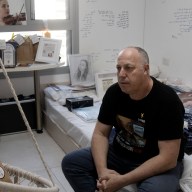 The NY CARES Act, a bill proposed by Brooklyn Sen. Kevin Parker, would help veterans like Lesly Fontaine, Jr., pictured, get college credit for their service.
The NY CARES Act, a bill proposed by Brooklyn Sen. Kevin Parker, would help veterans like Lesly Fontaine, Jr., pictured, get college credit for their service.
Credit: Gwen McClure/Metro
For nearly a year, Brooklyn resident Lesly Fontaine, Jr. drove a tank in Iraq. Now he’s hoping to get college credit for it.
“I’ve always wanted to finish up school,” said Fontaine, who left college after three years to join the Army in 2003.
That dream may soon become a reality. State Sen. Kevin Parker, a Brooklyn Democrat, is pushing for legislation that would help veterans like Fontaine bolster their resume with college credit easily understood in the civilian workplace.
The NY CARES Act (New York College Aid for Returning Empire State Servicemembers) calls for the Board of Regents to mandate that all universities and colleges in the state grant some college credit for military service.
For example, a combat engineer could earn engineering credits and a medical specialist would receive organic chemistry credit. The credit would be meted out based on the military training and experience received as compared to the college credit hours and classes for a given major.
The bill addresses one of the major struggles veterans returning to civilian life face: a lack of understanding by others as to how the skills they honed in the military translate to skills in the workplace.
A corporate headhunter, for example, might not see how the leadership experience of leading a platoon overseas could make someone into a desirable candidate for a project manager position in a Midtown office.
In its own language, the bill “seeks to prevent our service members and veterans from being unjustly penalized for their military experience.”
An opportunity like this —to get college credits for going overseas —is game-changing for service members, Fontaine said.
“That’s a really big incentive,” he said.
Fontaine, motivated in large part by 9/11, joined the army without finishing school. He doesn’t regret the choice, but because of other opportunities that came up —jobs, children —Fontaine said finishing school got put on the back-burner.
Fontaine works as a federal corrections officer. He loves working for the Department of Justice and said that with a college degree —and consequently, the ability to pursue further education —he would be a stronger candidate for a variety of other positions with the DOJ.
“I would stand out more,” he explained.
Parker is also hoping to persuade colleagues to pass the bill by pointing out the economic gain the state would derive: if schools in New York State create this opportunity for returning service members, veterans will be more inclined to enroll at schools in New York State.
It would also generate job opportunities for veterans, as CUNY and SUNY schools would be required to hire or use counselors with military experience. Those counselors would lead the way in facilitating this initiative.
Some SUNY schools already award college credit for military services, and there are ways to get individual accommodations at CUNY, but Parker said the statewide system created by this legislation would be fairer and more effective.
For veterans like Fontaine, the bill is also a recognition of the difficult work he and his peers did overseas.
“It’s very meaningful,” he said, “because there are a lot of veterans who did phenomenal things in the military, but sometimes the work that we did doesn’t translate.”
Follow Danielle Tcholakian on Twitter @danielleiat














